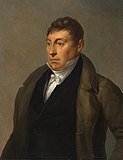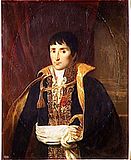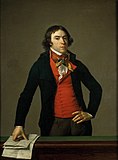| Revision as of 19:11, 19 January 2024 editAlbusWulfricDumbledore (talk | contribs)Extended confirmed users982 edits rv undiscussed large deletionTag: Undo← Previous edit | Revision as of 13:29, 20 January 2024 edit undoAlbusWulfricDumbledore (talk | contribs)Extended confirmed users982 edits infobox seats updated with most accurate seat numbers available at momentTag: Visual editNext edit → | ||
| (4 intermediate revisions by the same user not shown) | |||
| Line 2: | Line 2: | ||
| {{Infobox election | {{Infobox election | ||
| | seats2 = 80 | | seats2 = 80 | ||
| | seats1 = ''' |
| seats1 = '''500''' | ||
| | party1 = ] | | party1 = ] | ||
| | leader1 = ] ] | | leader1 = ] ] | ||
| Line 8: | Line 8: | ||
| | color1 = FDEE00 | | color1 = FDEE00 | ||
| | percentage2 = 12.7% | | percentage2 = 12.7% | ||
| | seats3 = 40 | | seats3 = 30-40 | ||
| | popular_vote2 = {{formatnum:4230}} | | popular_vote2 = {{formatnum:4230}} | ||
| | party2 = ] | | party2 = ] | ||
| Line 29: | Line 29: | ||
| | ongoing = no | | ongoing = no | ||
| | color3 = DA7B8B | | color3 = DA7B8B | ||
| | map_image = |
| map_image = | ||
| | map_caption = Composition of the Chamber of Deputies | | map_caption = Composition of the Chamber of Deputies | ||
| | title = ] | | title = ] | ||
| Line 39: | Line 39: | ||
| | party_colour = yes | | party_colour = yes | ||
| | colour2 = | | colour2 = | ||
| | registered = {{formatnum:66500}} | |||
| }} | }} | ||
| Line 61: | Line 62: | ||
| ! colspan="2" |Party | ! colspan="2" |Party | ||
| !Leader | !Leader | ||
| !Votes{{Citation needed|date=January 2024}} | |||
| !Votes | |||
| !% | !% | ||
| !Seats | !Seats | ||
| Line 70: | Line 71: | ||
| |'''26,356''' | |'''26,356''' | ||
| |'''80.95%''' | |'''80.95%''' | ||
| |'''500<ref name=":4">{{Cite book |last=Hussey |first=John |title=Waterloo: The Campaign of 1815 |publisher=Greenhill Books |year=2017 |isbn=9781784384944 |volume=1 |quote=He ordered elections, but the result was that out of 629 seats in the lower Chambre only about 80 were won by Bonapartists, between 30 and 40 went to Jacobins, and some 500 were gained by Liberals.}}</ref>''' | |||
| |'''510''' | |||
| |- | |- | ||
| | bgcolor="{{party color|Bonapartist}}" | | | bgcolor="{{party color|Bonapartist}}" | | ||
| Line 77: | Line 78: | ||
| |4,230 | |4,230 | ||
| |12.70% | |12.70% | ||
| |80<ref>{{Cite book |last=Pilbeam |first=Pamela M |title=Republicanism in Nineteenth-Century France |date=1995 |publisher=Macmillan Press Ltd |year=1995 |isbn=978-0-333-56672-5 |pages=58 |quote=Liberals dominated the new assembly, controlling 500 of the 629 seats. Only 80 Bonapartists were chosen. Napoleon had hoped for an obedient assembly, but found himself in partnership with an extremely argumentative one.}}</ref> | |||
| |80 | |||
| |- | |- | ||
| | bgcolor="#DA7B8B" | | | bgcolor="#DA7B8B" | | ||
| Line 84: | Line 85: | ||
| |1,952 | |1,952 | ||
| |6.35% | |6.35% | ||
| |30-40<ref name=":4" /> | |||
| |40 | |||
| |- | |- | ||
| | colspan="3" |'''Total''' | | colspan="3" |'''Total''' | ||
| |32,538<ref>{{Cite book |url=https://www.google.co.uk/books/edition/Revue_contemporaine_et_Athenaeum_fran%C3%A7a/xCZIAQAAMAAJ?hl=en&gbpv=1 |title=Revue contemporaine et Athenaeum français |date=1857-06-15 |publisher=Bureaux de la Revue contemporaine |year=1857 |volume=32 |location=Rue Mazarine, 9 |pages=127 |language=fr}}</ref> | |||
| |32,538 | |||
| |100% | |100% | ||
| | |
|629 | ||
| |} | |} | ||
Revision as of 13:29, 20 January 2024
| |||||||||||||||||||||||||||||
All 630 seats of the Chamber of Representatives 316 seats were needed for a majority | |||||||||||||||||||||||||||||
|---|---|---|---|---|---|---|---|---|---|---|---|---|---|---|---|---|---|---|---|---|---|---|---|---|---|---|---|---|---|
| Registered | 66,500 | ||||||||||||||||||||||||||||
| Turnout | 32,538 | ||||||||||||||||||||||||||||
| |||||||||||||||||||||||||||||
| |||||||||||||||||||||||||||||
Legislative elections were held in France from 8 May to 22 May 1815 for the period of the Hundred Days. The election was held to appoint deputies to the Chamber of Representatives established by the Additional Charter of 22 April 1815. The May 1815 election marked the first French legislative election since April 1799, and last of the 'republican system' till the Charter of 1830.
Context
After his return from the Isle of Elba and his entry into Paris on March 20, 1815, Napoleon Bonaparte returned to the throne. Aware that most of the French no longer want the authoritarian regime established in Year VIII and desirous of making the Bourbons completely forgotten, the Emperor resolves to liberalise the regime. For this, he had a new constitution drafted by Benjamin Constant, the Act additional to the constitutions of the Empire, which took up a good part of the liberal elements of the Charter of 1814.
This act overhauls the Parliament which is divided into two chambers: the Chamber of Peers , made up of hereditary peers appointed by the Emperor, and the Chamber of Representatives which is elected by census suffrage.
In the system established by the Charter of 1815, each district or department formed an 'electoral college'. The college would provide the framework of the elections in France for the next 100 years and continues in a similar fashion today. Each college would table the votes achieves by those who voted (any man of 25 years or older who paid taxes could vote).
There were 13 further 'special districts' established also known as arrondissements, between which the votes are equally divided according to a second table. These special districts represented certain areas of high concentrations of essential workers, like merchants, shipowners, bankers, etc. The electoral system therefore left 629 representatives from the departments, and 23 of which were from these special districts.
Elections
The Additional Act was ratified by plebiscite on June 1, 1815, but with a very large abstention. Indeed, this new constitution does not satisfy many people. If the royalists are obviously hostile to it, the Liberals and republicans find it too conservative. The liberal bourgeoisie criticizes the text in particular for not leaving enough initiative to the representatives in legislative matters.
In order to elect the Chamber of Representatives, the electoral colleges were convened for May 8, 1815, when Napoleon could very well have postponed the election in view of the international situation. Thus the constitution comes into force even before the people have spoken about it. Under these conditions, abstention is very high: in 67 departments out of 87, the colleges cannot bring together half of the voters plus one as the law provides. Only 7,600 of the 19,900 voters called up attend. In Marseille, a city where the bourgeoisie is royalist, thirteen electors choose four deputies.
Results
| Party | Leader | Votes | % | Seats | |
|---|---|---|---|---|---|
| Liberals | Gilbert du Motier, Marquis de La Fayette | 26,356 | 80.95% | 500 | |
| Bonapartists | Lucien Bonaparte, Prince Français, Prince de Canino | 4,230 | 12.70% | 80 | |
| Jacobin Republicans | Bertrand Barère de Vieuzac | 1,952 | 6.35% | 30-40 | |
| Total | 32,538 | 100% | 629 | ||
References
- ^ "Collège électoral du département et Collèges électoraux d'arrondissement (Mai et Août 1815, 1816) Élections législatives de 1819 et (préliminaires) de 1827 (FR-FRAD015 - FRAD015_27_J) - Archives Portal Europe". www.archivesportaleurope.net. Retrieved 2021-10-06.
- ^ "Acte additionnel aux Constitutions de l'Empire du 22 avril 1815 | Conseil constitutionnel". www.conseil-constitutionnel.fr (in French). Retrieved 2021-10-06.
- "LE SUFFRAGE CENSITAIRE (1815-1848) : ses électeurs et ses élus dans le Lot et dans le canton de Gramat" (PDF). Racines-Alvignac. Retrieved 6 October 2021.
- ^ "Connaissance de l'Assemblée : L'élection des députés". www.assemblee-nationale.fr. Retrieved 2021-10-06.
- ^ "Statistique électorale de la France de 1815 à 1877" (PDF). Journal de la société statistique de Paris. Retrieved 6 October 2021.
- ^ Hussey, John (2017). Waterloo: The Campaign of 1815. Vol. 1. Greenhill Books. ISBN 9781784384944.
He ordered elections, but the result was that out of 629 seats in the lower Chambre only about 80 were won by Bonapartists, between 30 and 40 went to Jacobins, and some 500 were gained by Liberals.
- Pilbeam, Pamela M (1995). Republicanism in Nineteenth-Century France. Macmillan Press Ltd. p. 58. ISBN 978-0-333-56672-5.
Liberals dominated the new assembly, controlling 500 of the 629 seats. Only 80 Bonapartists were chosen. Napoleon had hoped for an obedient assembly, but found himself in partnership with an extremely argumentative one.
{{cite book}}: CS1 maint: date and year (link) - Revue contemporaine et Athenaeum français (in French). Vol. 32. Rue Mazarine, 9: Bureaux de la Revue contemporaine. 1857-06-15. p. 127.
{{cite book}}: CS1 maint: date and year (link) CS1 maint: location (link)


